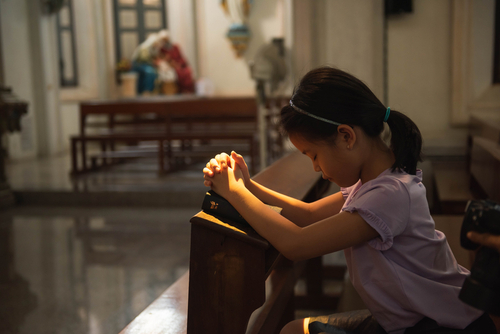In a particularly poignant passage in her poem, “The Leaf and the Cloud,” Mary Oliver pictures herself standing at the gravesite of her mother and father, reflecting on their lives. They were far from perfect and she doesn’t sugarcoat their faults. She openly names her mother’s heaviness of soul and her father’s immature faith. She knows that many of her own struggles have roots there.
However, she isn’t visiting their graves to lay blame on them. She’s there to kiss them an honest goodbye, at peace finally with both their less-than-perfect lives and their influence on her. She thanks them for everything, the good and the bad, wishes them well in the deep earth, and then says, “But I will not give them the kiss of complicity. I will not give them the responsibility for my life.”
All of us might do well to make this kind of recessive journey in terms of revisiting our early religious training. An interesting gravesite. Unfortunately, many of us don’t ever tarry there long enough to truly sort out what blessed us and what wounded us when some very fallible human agents introduced God to us.
Today it is common (almost fashionable) for people to look back only negatively on their early religious training. Indeed, many speak of being “in recovery” from it and often blame every kind of unhappiness and neurosis in their lives on their early religious training.
No doubt, some of this is valid, early religious training does leave a permanent mark on us. However, we owe it to ourselves, our parents, our early teachers, and to honesty to sort out the positives and negatives of our early religious background and, like Mary Oliver, make peace with it, even if we cannot give it the kiss of complicity.
What’s my own story? For me, awakening to consciousness and awakening to God and Church were inextricably linked. The Roman Catholicism of the time was the air I breathed as a child and this was Roman Catholicism prior to Vatican II, a Catholicism replete with both positives and negatives.
The spirituality of my childhood was one of absolute truths, of non-negotiable rules, of strong demands, of tribalism, and of narrow inclusivity. We, and we alone were the one true faith. Moreover, all of this was underwritten by a God who kept a scrupulous watch on your every action, didn’t easily give you permission to make a mistake, held the sixth commandment above all others, used shame as a weapon, and was frowning a lot of the time.
But, that was far from all of it. There was a whole other side. The family, community, and church that christened me had communal bonds that most communities today can only envy. You truly were part of a body, a family, and a community that incarnated a sense of transcendence that made faith something natural, and community part of your very identity. You knew you were a child of God and you knew too that you were a moral creature with real responsibilities to others and to God. You knew your eternal significance, your essential dignity, and the moral responsibility that came with that and you couldn’t exempt yourself from it.
What all of this did was ground you existentially in a very fundamental, non-negotiable human, moral, and religious truth, namely, that your life was not simply your own to do with whatever you wished. You knew in a way that you could not ignore, except by way of infidelity, that you were constitutively social, interdependent, ecclesial, and that God put you on this earth not just to make a good life for yourself.
You had a vocation, a certain duty to serve, and God, family, community, and Church could ask you to give your life over. Today, I see this particular brand on my soul as one of the most precious of all gifts that I received from the spirituality of my childhood. Whatever demons came along with that were worth it.
Besides, demons can be cast out and most of those buried inside the catechesis of my childhood have slowly been exorcized through the years. What did it? Lots of things: years of studying and teaching theology, reading good literature, having good spiritual directors, seeing a robust and joyous health in women and men of faith, persevering in my own dogged (and far-from-perfect) attempt to be faithful to prayer, the Eucharist, and church community through seven decades, and, not least, the grace of God.
Today I look back on my early religious training in a way wherein the negatives are eclipsed by the positives. I am thankful for it all, even its initial rigidity, timidity, tribalism, fearfulness, and false fears of God, because something inside all of that grounded me and taught me what is ultimately important. Indeed, rigidity, timidity, tribalism, and excess caution aren’t a bad place to start from because after they loosen their grip, you are free for the rest of your life. No small gift!

